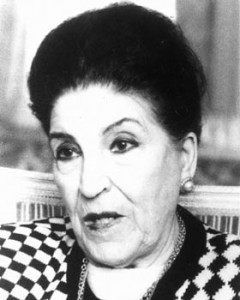 Opera fans around the world are grieving for the loss of famed soprano Licia Albanese, who died on August 15, 2014, at the age of 105, in her home in Manhattan.
Opera fans around the world are grieving for the loss of famed soprano Licia Albanese, who died on August 15, 2014, at the age of 105, in her home in Manhattan.
Born Felicia Albanese in Torre a Mare near Bari, Italy, in 1909, she debuted in Milan in 1934, replacing another soprano in Puccini’s Madama Butterfly. In forty years, she sang more than 300 performances of Cio-Cio-San, a role for which she became famous for.
Albanese made her Metropolitan Opera debut on February 9, 1940. She had an immediate success, and Albanese stayed at the Met for twenty-six seasons, singing at the same time at the San Francisco Opera. During her career, besides performing widely in recitals, concerts, and opera, she participated in benefits, entertained the troops, had her own weekly radio show, was a guest on other broadcasts and telecasts, and recorded frequently.

 Her voice had a distinctive character which the Italians call a lirico spinto, marked by its quick vibrato, incisive diction, intensity of attack and unwavering emotional impact. During her career she performed with many of the contemporary greats of opera—Beniamino Gigli, Claudia Muzio, Jussi Björling, and Franco Corelli. She worked with some of the best conductors of her time, but it is her work with Toscanini that has endured.
Her voice had a distinctive character which the Italians call a lirico spinto, marked by its quick vibrato, incisive diction, intensity of attack and unwavering emotional impact. During her career she performed with many of the contemporary greats of opera—Beniamino Gigli, Claudia Muzio, Jussi Björling, and Franco Corelli. She worked with some of the best conductors of her time, but it is her work with Toscanini that has endured.
In 1995, President Bill Clinton presented her with the National Medal of Honor for the Arts. She received awards and honorary degrees from Marymount Manhattan College, Montclair State Teachers College, Saint Peter’s College, New Jersey, Seton Hall University, University of South Florida, Fairfield University, Siena College, Caldwell College, and Fairleigh Dickinson University.
 In 2000, Rudolph Giuliani presented her with the prestigious Handel Medallion, the highest official honor given by the City of New York to individuals for their contributions to the city’s cultural life.
In 2000, Rudolph Giuliani presented her with the prestigious Handel Medallion, the highest official honor given by the City of New York to individuals for their contributions to the city’s cultural life.
Albanese was chairman of the The Licia Albanese-Puccini Foundation, founded in 1974 and dedicated to assisting young artists and singers. She also served as a trustee of the Bagby Foundation. She worked with the Juilliard School of Music, the Manhattan School of Music, and Marymount Manhattan College, and conducted master classes throughout the world.
Licia Albanese, who was interview by our magazine a few years ago, was also present at many events within the Italian American and operatic communities.







